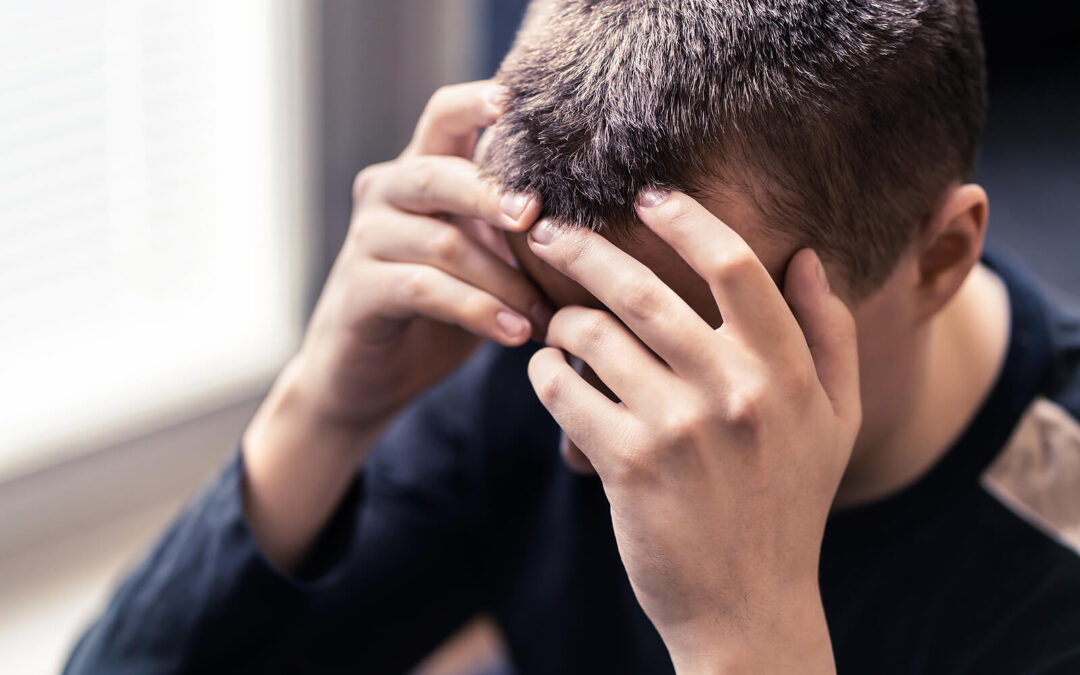Trauma is a universal human experience, yet how individuals cope with it can vary widely based on social conditioning, personal beliefs, and cultural expectations.
 For men, societal norms often discourage emotional vulnerability, leading many to hide their pain rather than confront it or express it in terms of anger. While this might seem like a viable coping mechanism in the short term, suppressing trauma or even any emotion can have profound and lasting effects on mental, emotional, and even physical health.
For men, societal norms often discourage emotional vulnerability, leading many to hide their pain rather than confront it or express it in terms of anger. While this might seem like a viable coping mechanism in the short term, suppressing trauma or even any emotion can have profound and lasting effects on mental, emotional, and even physical health.
In this blog, we’ll explore the ways men hide trauma, the underlying reasons for this behavior, and the consequences of bottling up emotional pain. We’ll also discuss pathways toward healing and the importance of men’s mental health.
Men often internalize trauma in ways that are less visible than outward displays of emotional distress. This concealment can take many forms, ranging from subtle changes in behavior to significant shifts in personality and coping mechanisms.
Here are some of the most common ways men hide their trauma:
Emotional Suppression
From a young age, many boys are taught to be tough or manly and avoid showing emotions like sadness or fear, as these emotions may mean that the person is soft or weak. Over time, this conditioning leads men to suppress their feelings, presenting a stoic or unaffected exterior. This is the denial of emotions, which often leads to an inability to identify any feelings, even ones such as happiness or love. While they may appear calm, unemotional, and distant, they are often experiencing significant inner turmoil.
Workaholism
Men may throw themselves into their careers as a way to distract from unresolved trauma or from identifying or dealing with unfamiliar emotions. They can avoid confronting painful emotions by keeping busy and focusing on professional achievements. While this approach might yield external success, it often comes at the cost of dysfunctional relationships and increased personal problems.
Substance Abuse
Alcohol and drugs are common coping mechanisms for men dealing with trauma. These substances provide temporary relief by numbing emotional pain, but they ultimately exacerbate mental health issues and can lead to addiction.
Aggression and Anger
For some men, unresolved trauma manifests as anger or irritability. Because anger is one of the few emotions that society deems “acceptable” for men to express, it becomes a default outlet for pain. Unfortunately, this can strain relationships and lead to further isolation.
Avoidance
Men may avoid anything that reminds them of their trauma, whether it’s certain people, places, or conversations. This avoidance can also extend to therapy or emotional introspection, further delaying the healing process.
When we attempt to hide our emotions or things that hurt us, we often do what we were trying to avoid. Perceived societal expectations or norms influence our behavior and thinking about what is acceptable. It is frequently hard to go against these norms or societal expectations. Men are often told that weakness cannot be tolerated or shown. Vulnerability is also frequently shunned by men.
Below are three other factors that may influence men not to express emotions.
Fear of Judgment
Men may fear being judged or stigmatized for expressing their emotions. This fear is powerful in professional or social environments where vulnerability might be perceived as a lack of strength or competence.
Lack of Emotional Education
Many men grow up without learning to identify, process, or articulate emotions. Without these tools, it becomes easier to suppress feelings than to confront them.
Cultural Norms
In some cultures, there is a strong emphasis on traditional gender roles that portray men as protectors and providers. This can create immense pressure to appear emotionally invulnerable, even in the face of significant trauma.
Suppressing trauma might provide temporary relief, but the long-term consequences can be devastating. Here’s what happens when men bottle up their emotional pain:
Mental Health Issues
Unaddressed trauma is a significant risk factor for conditions such as depression, anxiety, and post-traumatic stress disorder (PTSD). Men who suppress their emotions often experience a sense of emotional numbness or persistent low mood, which can lead to feelings of hopelessness. This hopelessness may lead to a lack of interest in doing things differently or addressing emotions since nothing can change or be different. Thus leading to the continuation and perpetuation of problems.
Relationship Struggles
 Trauma can create barriers to emotional intimacy, making it difficult for men to form or maintain healthy relationships. Suppressed emotions often surface as irritability, detachment, or an inability to communicate effectively, leading to misunderstandings and conflicts with loved ones, coworkers, and friends. The failure to effectively communicate needs becomes a barrier to many types of relationships.
Trauma can create barriers to emotional intimacy, making it difficult for men to form or maintain healthy relationships. Suppressed emotions often surface as irritability, detachment, or an inability to communicate effectively, leading to misunderstandings and conflicts with loved ones, coworkers, and friends. The failure to effectively communicate needs becomes a barrier to many types of relationships.
Physical Health Problems
The mind and body are deeply interconnected, and emotional distress can manifest as physical symptoms. Men who bottle up their trauma may experience chronic headaches, gastrointestinal issues, heart problems, or sleep disturbances. Stress hormones like cortisol, which remain elevated due to unresolved trauma, can also weaken the immune system over time.
Increased Risk of Substance Abuse
As mentioned earlier, many men turn to substances like alcohol or drugs to numb their pain. This coping mechanism often spirals into dependency, further complicating their mental and physical health.
Emotional Outbursts
Suppressing emotions doesn’t mean they disappear; they often resurface in unpredictable and unhealthy ways. Men who bottle up their trauma may experience sudden emotional outbursts, such as intense anger or sadness, that seem disproportionate to the situation.
Suicidal Thoughts
Tragically, the stigma surrounding men’s mental health contributes to alarmingly high suicide rates among men. Many feel they have no outlet for their pain or believe that seeking help is not an option, leading to a sense of hopelessness and despair.
The first step toward healing is recognizing that it’s okay not to be okay. We must challenge societal norms about suppressing emotions and encourage people to seek help when struggling.
Here are some strategies to break the cycle of emotional suppression:
Seek Professional Help
Therapies like cognitive-behavioral therapy (CBT), Eye Movement Desensitization and Reprocessing (EMDR), and talk therapy can provide safe spaces for men to process their trauma and develop healthier coping mechanisms.
Build Emotional Awareness
Learning to identify and articulate emotions is a crucial skill for healing. Practices like journaling, mindfulness, or meditation can help men become more in tune with their inner experiences.
Develop a Support Network
Sharing struggles with trusted friends, family members, or support groups can alleviate the burden of isolation. Knowing that others understand and care can be incredibly healing.
Challenge Societal Norms
Shifting cultural perceptions around masculinity by modeling vulnerability and emotional openness will go a long way to change the conversation about what is acceptable. By normalizing conversations about mental health, it helps pave the way for others to seek help.
Engage in Healthy Outlets
While physical activities like exercise can’t replace therapy, they can complement the healing process by reducing stress and promoting overall well-being.
 Hiding trauma might feel like the path of least resistance, but it ultimately leads to more profound pain and disconnection. For men, the pressure to conform to outdated notions of masculinity often prevents them from seeking the help they need. By breaking this silence and normalizing vulnerability, men can begin to heal, fostering healthier relationships with themselves, their families, coworkers, and friends.
Hiding trauma might feel like the path of least resistance, but it ultimately leads to more profound pain and disconnection. For men, the pressure to conform to outdated notions of masculinity often prevents them from seeking the help they need. By breaking this silence and normalizing vulnerability, men can begin to heal, fostering healthier relationships with themselves, their families, coworkers, and friends.
Start Therapy for Men in Powhatan, VA, and Across the State!
If you or someone you know is struggling with hidden trauma, please get in touch with Gray Horse Counseling to schedule a free consultation to discuss how therapy may help. True strength lies in the courage to face your pain and seek healing. You don’t have to face your pain alone, you can start your therapy journey with a caring therapist by following these simple steps:
- Schedule a free consultation
- Get to know more about me or visit the FAQ
- Start receiving the support you deserve!
Other Services Offered with Gray Horse Counseling
As a therapist, I know and understand men may experience concerns with more than one mental health issue. This is why I’m excited to offer other services including individual therapy, anxiety therapy, group therapy, clinical supervision, life transition therapy, EMDR, and depression therapy. I’m also happy to offer trauma therapy, equine sports therapy, and coaching as well. Learn more by visiting my FAQ today!

